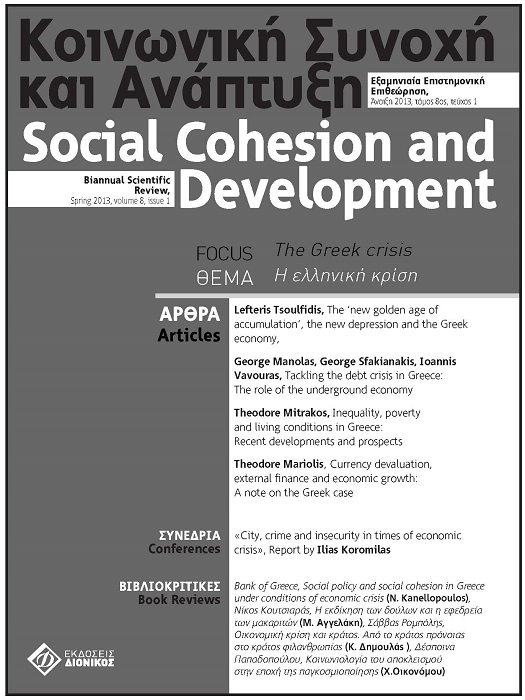Η “νέα χρυσή εποχή της συσσώρευσης”, η νέα ύφεση και η ελληνική οικονομία

Περίληψη
Στόχος του άρθρου είναι να ερευνήσει διεξοδι-
κά τις βαθύτερες αιτίες της τρέχουσας κρίσης και
της λεπτομερούς εκδήλωσής της στην περίπτωση
της ελληνικής οικονομίας. Το σημαντικότερο επι-
χείρημα του άρθρου είναι ότι η πρωταρχική αι-
τία της κρίσης εντοπίζεται στην πτωτική τάση του
ποσοστού κέρδους που από ένα σημείο και μετά
οδηγεί σε στασιμότητα και εν τέλει πτώση στη
μάζα των πραγματικών καθαρών κερδών που με
τη σειρά τους αποθαρρύνουν τις επενδύσεις και
οδηγούν σε αυξανόμενη ανεργία. Στην περίπτωση
της ελληνικής οικονομίας, αυτή η κρίση της κερ-
δοφορίας έχει επιδεινωθεί από τη συστολή των
σημαντικών παραγωγικών δραστηριοτήτων της,
ιδίως τη βιομηχανία και τη γεωργία. Η συστολή
αυτών των δραστηριοτήτων όχι μόνο επιδείνωσε
την κρίση αλλά επιπλέον προετοίμασε το έδαφος
για την ανάπτυξη των διαφορετικών μορφών έκ-
φρασής της, δηλαδή στη διόγκωση του χρέους
και σε πρωτοφανή υψηλά ποσοστά ανεργίας που
φέρνουν ολόκληρη την κοινωνία σε ένα αδιέξοδο.
Λεπτομέρειες άρθρου
- Πώς να δημιουργήσετε Αναφορές
-
Tsoulfidis, L. (2016). Η “νέα χρυσή εποχή της συσσώρευσης”, η νέα ύφεση και η ελληνική οικονομία. Κοινωνική Συνοχή και Ανάπτυξη, 8(1), 5–23. https://doi.org/10.12681/scad.9080
- Ενότητα
- Άρθρα

Αυτή η εργασία είναι αδειοδοτημένη υπό το CC Αναφορά Δημιουργού – Μη Εμπορική Χρήση – Παρόμοια Διανομή 4.0.
Οι συγγραφείς των άρθρων που δημοσιεύονται στην Κοινωνική Συνοχή και Ανάπτυξη διατηρούν τα δικαιώματα πνευματικής ιδιοκτησίας επί των άρθρων τους, δίνοντας στο περιοδικό το δικαίωμα της πρώτης δημοσίευσης. Άρθρα που δημοσιεύονται στην Κοινωνική Συνοχή διατίθενται με άδεια Creative Commons 4.0 και σύμφωνα με την άδεια μπορούν να χρησιμοποιούνται ελεύθερα, με αναφορά στο/στη συγγραφέα και στην πρώτη δημοσίευση για μη κερδοσκοπικούς σκοπούς και με δικαίωμα τροποποίησης μόνον με παρόμοια διανομή (αν αναμείξετε, τροποποιήσετε, ή δημιουργήσετε πάνω στο υλικό, πρέπει να διανείμετε τις δικές σας συνεισφορές υπό την ίδια άδεια όπως και το πρωτότυπο).

